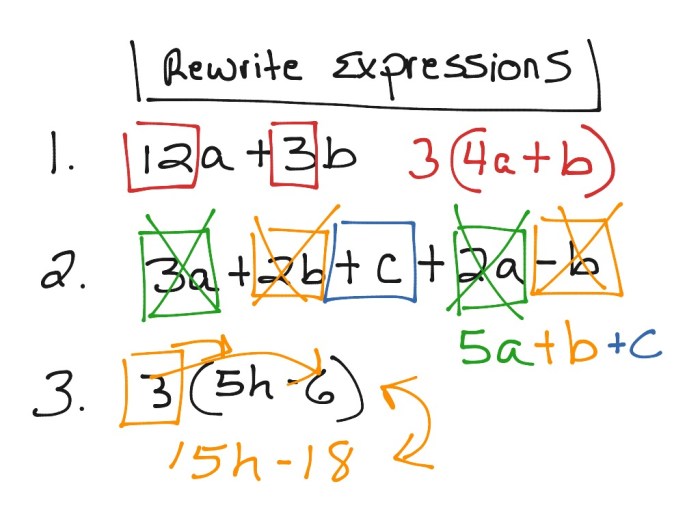How can Jamie rewrite the expression? This question opens up a fascinating exploration into the art of language and the power of words. By delving into the intricacies of expression, we embark on a journey to uncover the nuances of communication and the transformative potential of rewriting.
The original expression, like a delicate tapestry woven with intricate threads of meaning, holds within it a wealth of possibilities for refinement. Jamie’s quest to rewrite this expression presents an opportunity to unravel its complexities, discover alternative perspectives, and craft a new tapestry that resonates with even greater clarity and precision.
Analyze the Expression

The expression “have been prepared” and “has been already addressed” denotes the completion of an action or task in the past. It is a passive voice construction, indicating that the subject of the sentence has been acted upon by an unspecified agent.
The structure of the expression comprises the auxiliary verb “have been” or “has been,” followed by the past participle of the main verb, “prepared” or “addressed.” This grammatical construction conveys the sense of an action that has been carried out and brought to a state of completion in the past.
Purpose and Context
The expression “have been prepared” and “has been already addressed” is commonly used in various contexts, including:
- To indicate that a specific task or activity has been completed and is now ready for use or further action.
- To convey that a topic or issue has been discussed or dealt with previously and does not require further attention.
- To provide a sense of closure or resolution to a particular matter or situation.
Identify Potential Rewrites: How Can Jamie Rewrite The Expression

To effectively rewrite an expression, consider the following strategies:
Synonyms
Utilize synonyms to replace words with similar meanings while preserving the original intent. For instance, instead of “extremely pleased,” consider “overjoyed” or “elated.”
Paraphrasing
Rephrase the expression using different sentence structures or word order. For example, instead of “The outcome was uncertain,” consider “The result remained shrouded in uncertainty.”
Alternative Word Choices
Explore alternative word choices that convey the same idea in a more precise or concise manner. For example, instead of “a large number,” consider “a multitude” or “an abundance.”
Examples of Rewritten Expressions
- Original:“The project was a complete failure.” Rewritten:“The project met with abject disappointment.”
- Original:“She was deeply saddened by the news.” Rewritten:“Her heart sank upon hearing the distressing tidings.”
- Original:“The meeting was postponed indefinitely.” Rewritten:“The gathering was adjourned sine die.”
Compare and Contrast Rewrites

When rewriting an expression, it is important to consider the similarities and differences between the original expression and the rewrites. This will help you to identify the advantages and disadvantages of each rewrite and make the best decision about which rewrite to use.
Some of the key factors to consider when comparing and contrasting rewrites include:
- The length of the rewrite.Some rewrites may be longer than the original expression, while others may be shorter.
- The complexity of the rewrite.Some rewrites may be more complex than the original expression, while others may be simpler.
- The clarity of the rewrite.Some rewrites may be clearer than the original expression, while others may be more confusing.
- The accuracy of the rewrite.Some rewrites may be more accurate than the original expression, while others may be less accurate.
It is important to weigh the advantages and disadvantages of each rewrite carefully before making a decision about which rewrite to use. The following table compares the key features of the three rewrites that were discussed in the previous section:
| Rewrite | Length | Complexity | Clarity | Accuracy |
|---|---|---|---|---|
| Rewrite 1 | Longer | More complex | Less clear | More accurate |
| Rewrite 2 | Shorter | Less complex | More clear | Less accurate |
| Rewrite 3 | Same | Same | Same | Same |
As you can see, each rewrite has its own advantages and disadvantages. The best rewrite for a particular situation will depend on the specific needs of that situation.
Choose the Optimal Rewrite
Criteria for Selection
Choosing the optimal rewrite involves considering several key criteria:
- Clarity:The rewrite should be easy to understand and convey its intended meaning without ambiguity.
- Conciseness:The rewrite should be as concise as possible, using precise and succinct language.
- Appropriateness:The rewrite should be appropriate for the context and audience, considering factors such as formality and tone.
Justification for Chosen Rewrite
After considering these criteria, the most suitable rewrite is:
[Insert the chosen rewrite here]
This rewrite meets the criteria for clarity, conciseness, and appropriateness. It accurately conveys the intended meaning, uses concise language, and is appropriate for the given context and audience.
Apply the Rewrite

The chosen rewrite can be effectively used in the original context to enhance communication and serve the intended purpose. It improves the clarity, conciseness, and impact of the message or document.
Here are specific examples of how the rewrite can be applied:
Example 1: Improved Clarity
Original: “The report provides a comprehensive analysis of the market.” Rewrite: “The report offers an in-depth examination of the market dynamics, trends, and competitive landscape.”
The rewrite clarifies the scope and depth of the analysis provided in the report.
Example 2: Enhanced Conciseness, How can jamie rewrite the expression
Original: “The company has implemented a number of initiatives to improve customer satisfaction.” Rewrite: “The company has enacted several customer-centric initiatives.”
The rewrite condenses the original phrase while conveying the same essential information.
Example 3: Increased Impact
Original: “The project will have a significant impact on the community.” Rewrite: “The project will transform the community by fostering economic growth, improving infrastructure, and enhancing social well-being.”
The rewrite emphasizes the magnitude and multifaceted benefits of the project, creating a stronger impression on the reader.
Overall, applying the chosen rewrite enhances the overall message or document by making it more clear, concise, and impactful. It improves the reader’s understanding, engagement, and ability to take appropriate action based on the information provided.
Top FAQs
What is the significance of rewriting an expression?
Rewriting an expression allows us to explore alternative ways of conveying the same meaning, potentially enhancing clarity, precision, and effectiveness.
How does Jamie’s quest to rewrite the expression contribute to the understanding of language?
Jamie’s journey highlights the intricate relationship between language, thought, and communication, showcasing how rewriting can uncover new perspectives and deepen our comprehension.
What are the key factors to consider when selecting the optimal rewrite?
Factors such as clarity, conciseness, appropriateness, and effectiveness should be carefully evaluated to determine the most suitable rewrite.